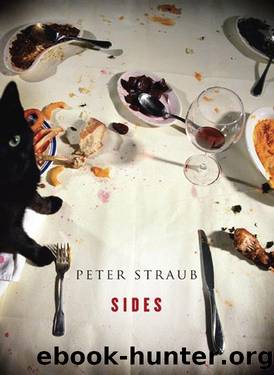Sides by Peter Straub

Author:Peter Straub [Straub, Peter]
Language: eng
Format: mobi
Publisher: Cemetery Dance Publications
Published: 2011-07-10T00:00:00+00:00
Two Essays and
a Frivolity
The Fantasy of
Everyday Life
He practically said he was Elvis, so you should not be surprised by his behavior. That was there right from the beginning. On the âCharlie Rose Show,â he looked straight at the camera and sang âDonât Be Cruel.â And that blond woman standing next to him is the celebrated Scottish socialite, Lady Macbeth. Lady Macbeth knew what she was doing when she consented to become Mrs. Elvis, and she is doing her best to put up with all that rocking and rolling. They came from the Arkansas Highlands in a pink Cadillac, and they left a trail of corpses in their wake.¹ Now that they live in that handsome building on Pennsylvania Avenue, the one with the iron fence around it, corpses tumble out of broom closets, what used to be the Nixon Helipad looks like the last act of Hamlet,² and the Earl of South Africa and Tiffany, his new girlfriend, are coming for a State Dinner. âDonât Be Cruelâ is played before every press conference.³ They have been shot at only once, and they werenât even there at the time.4 Every night after the cannon smoke has been dispersed by the staff as yet unsubpeonaed, they get together and plot.
I like these people. They are creatures of the purest fantasy, and they prove over and over that this world, ours, is an alternate universe. No authentic universe would act this way for a second. You might have some giddiness now and again, and the occasional extravaganza, but giddy extravaganzas such as bodies discovered in the trunks of pink Cadillacs, never. I know what an authentic universe is like, and so do you. We share a dim, ancestral, memory-like illusion. Itâs like a dream-fragment, of a world that began with the pastoral and darkened over time into an industrial society that was flawed, maybe even terrible in some ways, especially in those precincts dominated by dark satanic mills, but at least theoretically open to improvement.5 This world had rules. It had inexorable causes and immutable results. I believe the authentic universe was largely English, though it did have a French Quarter.6 Either George Eliot grew up there, or he imagined it in ravishing detail.7 Among other things, the authentic universe paid attention to the kind of rationality evolved from common sense, to logical connections, to humane values and nuanced judgments, and, since we are talking about writing, to the realistic tradition.
By âthe realistic tradition,â I mean the assumptions about the contract between reader and author and the representational techniques found, speaking very generally now, in the novels of Jane Austen, Anthony Trollope, Arnold Bennett, and John Galsworthy; in Balzac, Zola, and some of Flaubert; in Tolstoy and Turgenev; in Howells, Dreiser, and James T. Farrell.8 What does not emerge directly from the nineteenth century is rooted in it. Harold Robbins started as a disciple of Farrellâs, but speedily ascended into the altogether elsewhere.9 In the late 1970s, I thought that people like Robbins
Download
This site does not store any files on its server. We only index and link to content provided by other sites. Please contact the content providers to delete copyright contents if any and email us, we'll remove relevant links or contents immediately.
| Diaries & Journals | Essays |
| Letters | Speeches |
The Rules Do Not Apply by Ariel Levy(3915)
Bluets by Maggie Nelson(3724)
Too Much and Not the Mood by Durga Chew-Bose(3701)
Pre-Suasion: A Revolutionary Way to Influence and Persuade by Robert Cialdini(3422)
The Motorcycle Diaries by Ernesto Che Guevara(3345)
Walking by Henry David Thoreau(3238)
What If This Were Enough? by Heather Havrilesky(2947)
The Day I Stopped Drinking Milk by Sudha Murty(2861)
Schaum's Quick Guide to Writing Great Short Stories by Margaret Lucke(2808)
The Daily Stoic by Holiday Ryan & Hanselman Stephen(2713)
Why I Write by George Orwell(2363)
Letters From a Stoic by Seneca(2337)
The Social Psychology of Inequality by Unknown(2316)
A Short History of Nearly Everything by Bryson Bill(2138)
Feel Free by Zadie Smith(2104)
Insomniac City by Bill Hayes(2087)
A Burst of Light by Audre Lorde(1983)
Upstream by Mary Oliver(1940)
Miami by Joan Didion(1884)
